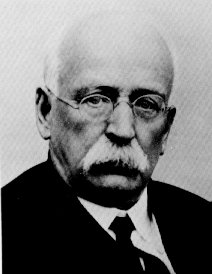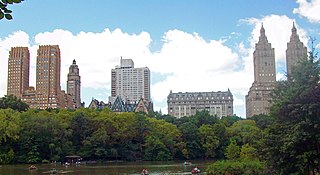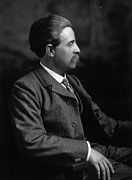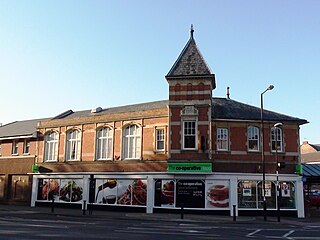Related Research Articles

A cooperative is "an autonomous association of persons united voluntarily to meet their common economic, social and cultural needs and aspirations through a jointly owned and democratically-controlled enterprise". Cooperatives are democratically controlled by their members, with each member having one vote in electing the board of directors. Cooperatives may include:

Sir Ebenezer Howard was an English urban planner and founder of the garden city movement, known for his publication To-Morrow: A Peaceful Path to Real Reform (1898), the description of a utopian city in which people live harmoniously together with nature. The publication resulted in the founding of the garden city movement, and the building of the first garden city, Letchworth Garden City, commenced in 1903.

A housing cooperative, or housing co-op, is a legal entity, usually a cooperative or a corporation, which owns real estate, consisting of one or more residential buildings; it is one type of housing tenure. Housing cooperatives can be owned by a non-profit organization or by shareholders, they are a distinctive form of home ownership that have many characteristics that differ from other residential arrangements such as single family home ownership, condominiums and renting.
The Town and Country Planning Association (TCPA) is an independent research and campaigning charity founded and based in the United Kingdom. It works to enable homes, places and communities in which everyone can thrive. Through its research, training, events, publications, and campaigns, it works to challenge, inspire and support people to create healthy, sustainable and resilient places that are fair for everyone. It does so informed by the Garden City Principles.

Co-operative Group Limited, trading as Co-op, is a British consumer co-operative with a group of retail businesses including food retail and wholesale, insurance, legal services, and funerals.

The Phone Co-op was an independent consumer co-operative in the United Kingdom until 2018, when facing serious financial difficulties, it transferred itself into a sister society, where it remains today. It provides landline, mobile telephone and Internet services, including web hosting and broadband. It is managed alongside the Electricity and gas Now part of the Midcounties Co-operative, the largest independent co-operative in the UK, it is owned by its customer-members who share in its profits. This makes The Phone Co-op the only telephone co-operative in the UK.

Sir Raymond Unwin was a prominent and influential English engineer, architect and town planner, with an emphasis on improvements in working class housing.

The garden city movement was a 20th century urban planning movement promoting satellite communities surrounding the central city and separated with greenbelts. These Garden Cities would contain proportionate areas of residences, industry, and agriculture. Ebenezer Howard first posited the idea in 1898 as a way to capture the primary benefits of the countryside and the city while avoiding the disadvantages presented by both. In the early 20th century, Letchworth, Brentham Garden Suburb and Welwyn Garden City were built in or near London according to Howard's concept and many other garden cities inspired by his model have since been built all over the world.

The Royal Arsenal Co-operative Society (RACS) was a large consumer co-operative based in south east London, England. The co-operative took its name from the Royal Arsenal munitions works in Woolwich and its motto was: "Each for all and all for each". In 1985 it merged into the national Co-operative Wholesale Society.

Gunnersbury Park is a park in the London Borough of Hounslow between Acton, Brentford, Chiswick and Ealing, West London, England. Purchased for the nation from the Rothschild family, it was opened to the public by Neville Chamberlain, then Minister of Health, on 21 May 1926. The park is currently jointly managed by Hounslow and Ealing borough councils. A major restoration project funded by the Heritage Lottery Fund was completed in 2018. The park and garden is Grade II listed.
The United Kingdom is home to a widespread and diverse co-operative movement, with over 7,000 registered co-operatives owned by 17 million individual members and which contribute £34bn a year to the British economy. Modern co-operation started with the Rochdale Pioneers' shop in the northern English town of Rochdale in 1844, though the history of co-operation in Britain can be traced back to before 1800. The British co-operative movement is most commonly associated with The Co-operative brand which has been adopted by several large consumers' co-operative societies; however, there are many thousands of registered co-operative businesses operating in the UK. Alongside these consumers' co-operatives, there exist many prominent agricultural co-operatives (621), co-operative housing providers (619), health and social care cooperatives (111), cooperative schools (834), retail co-operatives, co-operatively run community energy projects, football supporters' trusts, credit unions, and worker-owned businesses.

A consumers' co-operative is an enterprise owned by consumers and managed democratically and that aims at fulfilling the needs and aspirations of its members. Such co-operatives operate within the market system, independently of the state, as a form of mutual aid, oriented toward service rather than pecuniary profit. Consumers' cooperatives often take the form of retail outlets owned and operated by their consumers, such as food co-ops. However, there are many types of consumers' cooperatives, operating in areas such as health care, insurance, housing, utilities and personal finance.

Cooperative economics is a field of economics that incorporates cooperative studies and political economy toward the study and management of cooperatives.
The history of the cooperative movement concerns the origins and history of cooperatives across the world. Although cooperative arrangements, such as mutual insurance, and principles of cooperation existed long before, the cooperative movement began with the application of cooperative principles to business organization.
A student housing cooperative, also known as co-operative housing, is a housing cooperative for student members. Members live in alternative cooperative housing that they personally own and maintain. These houses are designed to lower housing costs while providing an educational and community environment for students to live and grow in. They are, in general, nonprofit, communal, and self-governing, with students pooling their monetary and personal resources to create a community style home. Many student housing cooperatives share operation and governing of the house. As with most cooperatives, student housing coops follow the Rochdale Principles and promote collaboration and community work done by the members for mutual benefit.

Henry Harvey Vivian was an English trade unionist, and Liberal Party politician and campaigner for industrial democracy and co-partnership, especially noted for his work in co-partnership housing.
Penny Bethke (1950–2011) was a senior manager in the Ontario co-operative sector, a community leader, and a social activist. Serving in a range of positions on the management and boards of a number of credit union, co-operative and labour organizations between 1975 and 2011, it has been said that Bethke was responsible for tens of thousands of people living in co-operative housing, for numerous initiatives on social responsibility, and for inspiring a generation of young people in the co-operative movement.

Sybella Gurney was a housing reformer and leader of the co-partnership and cooperative housing movement, who 'made important and largely unrecognized contributions to British community design theory and practice'.
References
- Birchall, Johnston, Co-partnership and the Garden City Movement, Planning Perspectives, 10: 4, 1995, p329 – 358. ISSN 0266-5433, Online ISSN 1466-4518. doi : 10.1080/02665439508725828
- ↑ Doug Peacock, "SOCIAL STRIFE: The birth of the Co-op", Cotton Times: understanding the industrial revolution, p. 3, archived from the original on 2008-09-08, retrieved 2010-08-27